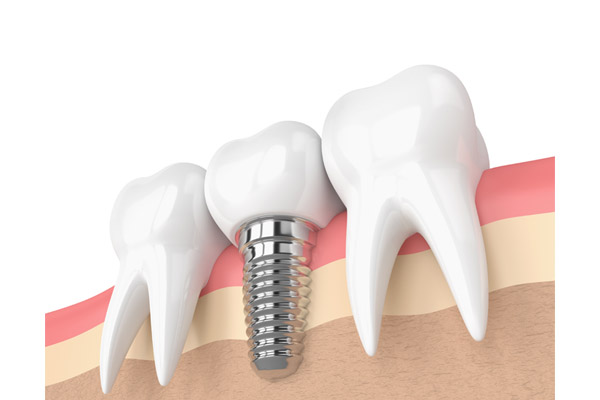 For many people, dental implants can be a permanent solution for dealing with lost or damaged teeth. This type of treatment is designed to last a lifetime. Once it is complete and healed, patients can enjoy a more beautiful smile without having to worry about any dietary changes, difficult home care, or unnatural-looking teeth.
For many people, dental implants can be a permanent solution for dealing with lost or damaged teeth. This type of treatment is designed to last a lifetime. Once it is complete and healed, patients can enjoy a more beautiful smile without having to worry about any dietary changes, difficult home care, or unnatural-looking teeth.
Dental implants require the placement of titanium rods deep below the gum surface. These rods must fuse to the jaw bone to provide support and stability for the implant. Without enough healthy bone tissue, patients cannot undergo this type of treatment. However, bone grafts can help make dental implants a possibility for those with weakened or damaged jawbones.
The causes of jaw bone deterioration
There are many reasons a patient can experience bone loss in the jaw. This happens most often when a lost tooth is not promptly replaced. The underlying bone is no longer stimulated and starts to deteriorate. Other situations can lead to deterioration as well, including:
- Trauma to the area
- Osteoporosis
- Certain prescription medications
- Severe gum disease
- Genetic conditions
It is important to see a dentist to determine the true underlying cause of bone loss.
Understanding the bone graft and implant process
A bone graft is a surgical procedure. During the surgery, healthy bone is placed in the damaged area to add support and encourage healing and repair. While bone grafts are sometimes used to prepare patients for dental implants, they can also be used throughout the body to treat a variety of bone issues. Sometimes, the healthy bone is taken from somewhere else in the patient's body or from another person. In the case of dental work, bone grafts can be natural or synthetic, depending on the extent of the damage and the type of repair and support needed.
How long a patient must wait until receiving an implant after a bone graft can vary from person to person. If the damage is minimal and the bone graft was small, healing can occur in a matter of weeks. In rare situations, a dentist may even be able to place an implant during bone graft surgery. For most people, a few months of healing and new bone growth is required before the implant process can begin.
Once a patient's jawbone can sufficiently support an implant, the metal rods are surgically inserted. The jaw bone will grow into the rods and create a permanent fusion over the course of the next several weeks. Then, the abutment can be placed, which connects the rods under the soft tissues to the tooth cap above the surface. In some situations, patients may be able to receive a same-day implant, which allows for the placement of all components at the same time. A dentist can help determine whether or not you are a good candidate for this treatment approach.
Conclusion
With the help of a bone graft, patients who have experienced jaw bone damage or deterioration can still receive dental implants. More healing time may be required, but many people find the results are worth the wait. This entire treatment approach can help patients enjoy better oral health and a more beautiful smile.
Request an appointment or call Rafael E. Cordero, DDS PA at 561-763-9221 for an appointment in our Palm Beach Gardens office.
Recent Posts
The teeth are an essential part of the human body, which is why so many people turn to dental implants. Without enough teeth, it is harder for people to bite into and chew their food and harder to enunciate certain words when speaking. When many teeth are missing, the shape of the face will change,…
If you are missing one or more teeth, you may consider getting dental implants. Implants are a popular tooth replacement option, as they look and feel like natural teeth and, most enticing of all, have the potential to last for a lifetime. That said, though implants offer several benefits, they do come with a few…
According to the American College of Prosthodontists, more than 120 million Americans are missing one or more teeth. Dental implants are a common treatment method and are becoming increasingly popular. Implants are a permanent solution to missing teeth and help to restore the functionality needed for proper biting, chewing, and even speaking. A potential recipient…


